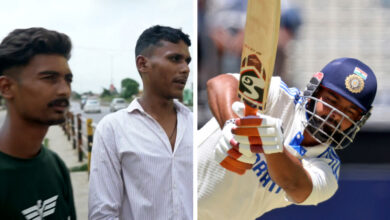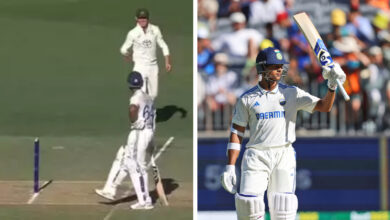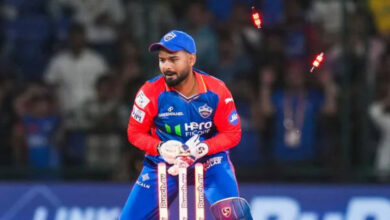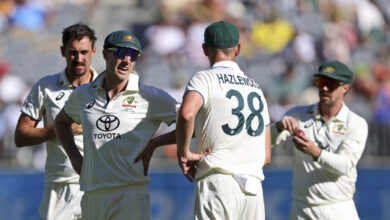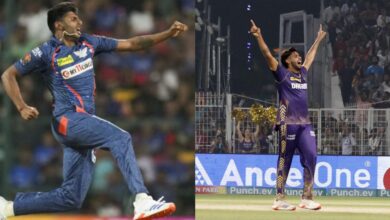Paris Olympics, hockey: Sukhjeet Singh’s miracle – from partial paralysis 6 years ago to being at the heart of India’s attacks | Hockey News

Sukhjeet Singh believes in miracles. His career, the forward inss, is one.Today, he wheels away even before the ball reaches him, slipping past defenders, receiving, dodging, scoring and setting up his teammates. Six summers ago, he couldn’t even get out of his bed without someone’s help.
“Bilkul he toot chuka tha mein (I was completely broken),” Sukhjeet says.
The 27-year-old is in a cozy hotel room in London, where India begin a Pro League mini-tournament against Germany and Britain on Saturday. His roommate is former India captain Manpreet Singh, one of the most impactful players of this generation. “I am sharing a room with someone I used to see on TV,” he says.
Sukhjeet, who scored and assed during the Belgium leg of the Pro League, isn’t being fan-boyish, although he can’t stop gushing about Manpreet’s ‘vision and scoops’. But in truth, he is only humble about his journey.
None of this – playing for India, sharing a room with a former captain, scoring goals – seemed possible mid-2018, when he was escorted out of the Amritsar airport in a wheelchair.
Sukhjeet’s father, Ajit – teary-eyed and speechless – lifted his son from the wheelchair and made him sit inside their car. As they drove home, the only sound that could be heard was that of the father and son sniffling, mourning a hockey career they thought had died.
“Sabse bura samay,” he says. “It was the worst day, the worst phase of my life.”
India’s Sukhjeet Singh jostling to control the ball during a match. (Hockey India)
Just a few months earlier, when Ajit had dropped him at the airport, the scenes couldn’t have been more contrasting. The then-21-year-old got his maiden national team camp call-up. And Ajit, a former Punjab Police player, sent off his son to the Sports Authority of India, Bangalore, with a lot of fanfare. A decade-and-a-half of single-minded, unwavering dedication was finally being rewarded.
“There were tears that day too,” Sukhjeet says. “But those were happy tears. I was finally on the cusp of achieving something that I and my father dreamt of together – to play for India. My father couldn’t make it to the national team. So it was like I was living his dream.”
The dream turned into a nightmare only ‘three or four days later’. In a new city, new environment and around new people, the young boy from Jalandhar fell sick. Initially, it was only fever. “Still, I pushed through. I didn’t want to let the opportunity go to waste and I wanted to prove to everyone that I belonged there. So, I trained and trained.”
Slowly, he developed a back pain. Sukhjeet tried to brave that out too but it became impossible to continue. And so, he sought the physio’s intervention. “The physio was from Australia and I wasn’t fluent in English. So, I turned to a couple of my seniors – Ramandeep Singh and Akashdeep Singh. With their help, I explained to the physio my problem and he began the treatment,” Sukhjeet says.
It, however, only was the beginning of his ordeal. “During the treatment, the physio pinched a nerve and the problem became very serious. My right side got paralysed. Bilkul dead.”
The smile that was on Sukhjeet’s – ‘Sukhi’ to his teammates – face while talking about travelling the world with India and sharing a room with Manpreet is long gone. His voice quivers and speaks in staccato, searching for the right words.
They performed half a dozen scans but ‘there wasn’t a confirmed diagnosis’. The doctors put him on painkillers but once its effect would subside, Sukhjeet would writhe in pain.
“You feel so helpless. I couldn’t get up from the bed myself. Couldn’t go to the washroom, couldn’t eat. I was alone at the hospital, wondering how things went so wrong.”
Finally, after months of treatment when he was discharged from the hospital, Sukhjeet was allowed to take a flight and go home. But not before he suffered another body blow – being released from the national camp.
“I thought, what would I do with my life now?”
***For as long as he can remember, Sukhjeet had been living two dreams simultaneously: his and his father’s.
Ajit was good at hockey to the extent that he landed a sports quota job with the Punjab Police but not good enough to make it to the national team. “So, he put all his efforts into making me an international player,” Sukhjeet says.
Sukhjeet remembers the first hockey stick he got. He was six. Aijt returned from police duty, got his full-size wooden stick and hacked it into half so that Sukhjeet could use it.
India’s Sukhkeet Singh in action. (Hockey India)
Ajit taught his son all the basics of the sport. But he was humble to realise his limitations as a coach and enrolled him into an academy in Chandigarh. “Even there, he would make long journeys twice or thrice a week after his duty to give me milkshakes and bananas,” Sukhjeet says. “He struggled a lot for me.”
When he got partially paralysed, Sukhjeet might have lost hope of playing again. But for Ajit, giving up wasn’t an option. “Father Saab motivated me. He used to return home from work and give me a massage, take me to doctors and ensure I ate well. For one or two months, he gave up his life so I could get mine on track.”
After nearly six months of treatment, Sukhjeet recovered enough to pick up the hockey stick again. The strong basics Ajit drilled into him in the early years came in handy as Sukhjeet realised he hadn’t lost his muscle memory. the end of 2019, he was back on the domestic circuit and when the pandemic hit, the forward used the time to build more muscle and recover all the strength he’d lost.
And in 2021, after the Graham Reid-led coaching staff decided to infuse fresh blood into the Indian team that had won the Tokyo Olympics bronze medal, Sukhjeet was back on the radar. In the three years since, he’s made all the right noises to be in the reckoning for a place in the Paris-bound squad.
Sukhjeet isn’t only about goals. In Craig Fulton’s visualisation of perfect hockey, forwards must defend and defenders have to venture forward. Sukhjeet, when on the field, leads the first line of defence with his re-tackling, trying to win the ball back immediately after it’s lost to stop the counterattacks, uses his speed to get into dangerous positions and is often at the right place at the right time.
Against the reigning Olympic champions Belgium the other day in Antwerp, his positioning and finishing qualities came to the fore.
Hardik Singh won the possession in the midfield and began running diagonally towards the right, dragging the defenders with him. Sukhjeet was near the top of the left side of ‘D’, the only Indian forward in the attacking circle and marked closely a defender.
As Hardik released the ball to a forward-marching Harmanpreet behind him, Sukhjeet circled the defender, evaded him and positioned himself at the penalty spot anticipating Harmanpreet’s cross. The captain obliged with a pin-point delivery that Sukhjeet deflected past the goalkeeper.
It was a silky smooth build-up and finish, the kind of which isn’t seen too often from India’s forwards. Earlier in the game, Sukhjeet found space in a crowded ‘D’ to set-up a scoring chance for Araijeet Singh Hundal and in the next match, he raked in more asss against 2016 Olympic champions Argentina.
He has been at the heart of the forward line’s resurgence, which comes just in time for the Paris Olympics. “We are focussed on the match now but everything we are doing is keeping in mind the Olympics. So yes, I am excited,” Sukhjeet says. “But I am also grateful for the second chance I’ve got. It’s a miracle that I am playing.”



